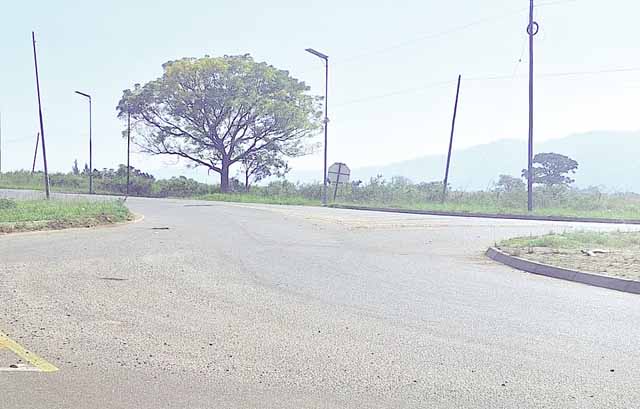By SUNDAY OBSERVER REPORTER | 2018-05-06

Food security is a very important tenet of national development. Starting today, the Sunday Observer will be profiling some of the people who are keeping the wheels of maize production in the country in motion. One such person is the current CEO of the National Maize Corporation (NMC), Sabelo Msibi, who we had a chance to interview last week.
When Msibi joined NMC at a time when the Category A parastatal was sailing in murky waters. The maize reserves at the time had reached an all-time low, and so were the coffers.
In 2014, NMC had recorded a deficit of about E80 000, with an annual turnover of E71m. That situation, says Msibi, presented itself as a challenge to be tackled and conquered.
He is quick to attribute the resultant successes in subsequent years to his team, which he speaks fondly of.
“We had to restructure the organisation in 2016 so as to realign the structure to the strategy. That exercise saw the introduction of new departments: the restructuring saw the birth of the positions of Chief Operations Officer (COO) and Human Resources and Administration, divisions of the Agri-Business, marketing and communications, procurement as well as quality assurance SHQ. Agri-Business is responsible for farmer development as a strategy for increasing local maize production and the role of the COO is to ensure revival and efficient management of the organisation’s core operations and functions,” says Msibi.
At the end of his first reporting year at NMC, Msibi says the organisation registered profits of E7.1 million from a negative E80 000 position the previous years, with positive cash flow that has not been seen in many years. The turnover increased to E110 million from the E71 million recorded the previous year. The following year, profits increased by E700 hundred thousand to E7.8million. However, due to the El Nino drought that affected the country and the entire region in 2016, the profits dropped to E1.2 million that year.
Meanwhile, maize reserves tremendously increased to 3 000MT (metric tonnes) in 2016 from less than 250MT when he joined the organisation in 2014.
Probed on how he managed to turnaround the fortunes of the company in somewhat short space of time, Msibi says NMC had to strategically establish long-term contracts with suppliers. NMC sources its maize locally and mainly from South Africa. He says they negotiated 14 to 30-day credit-facilities with suppliers, and at the same time negotiated new overdraft terms with their bankers.
“We also improved our payment systems so as to instil confidence in our suppliers,” he says. “While we deal with high volumes of maize and sugar beans and rice, we are very strict when it comes to quality issues; hence we introduced a food safety standard which we religiously update.
This has resulted in high rejection rates of poor quality maize from suppliers, something that has increased consumer confidence in our products but at the same time frustrated farmers prompting us to make some arrangements that will bring certain relief to farmers this coming harvesting season. These changes will be announced in appropriate time.”
Outlining further milestones achieved in the past four years, Msibi revealed that the NMC introduced and established twelve maize distribution centres throughout the country, especially in drought-stricken parts. He says they also introduced a new infrastructure management system, resulting in major rehabilitation work being done on silos in all regions including the Matsapha main depot. In line with their new infrastructure development model, the NMC will be building more silos countrywide, particularly at highly maize production areas.
Maize
The first silo will be built at Sigangeni, in the Hhohho region. The establishment of such silos, says Msibi, will help maize farmers store their maize with the NMC, without necessarily being compelled to sell it to the NMC.
While NMC’s primary role has been of a product marketing nature, the evident low supply of locally produced maize has forced the organisation to embrace farmer development as a second core function. In this regard, Msibi says NMC introduced farmer development services in 2016, where the Ministry of Agriculture redeployed ten extension officers to NMC and these were further deployed throughout the high maize producing area in the country as assistant farmer development officers (AFDOs). Also, as part of the farmer development strategy, NMC introduced contract farming for both maize and sugar beans, where the organisation gives attractive incentives to signed up farmers. Currently, there are 116 contracted maize farmers, up from 51 the previous season.
“Of course, we have even more farmers not yet contracted who bring and sell their maize to us because we are a guaranteed market,” explains Msibi.
To incentivise maize farmers who opt to sell their maize to the NMC, Msibi says they introduced the CEO’s Award in 2015 – an initiative that rewards the top ten farmers who sell most maize to NMC. Last year, the top ten got over E85 000 worth of farming inputs from the NMC, as well as an all-expenses-paid educational trip to South Africa as prize package. NMC also continues to sponsor National Maize competition (NAMCOM) annually, however, this will be reviewed so that it remains relevant to current times.
…Msibi shares his academic and professional background
Msibi has diverse experience across various sectors including banking, accounting, tax-administration, hospitality, as well as within non-governmental organisations and municipalities both locally and abroad. Before joining the NMC, Msibi served at the Swaziland Revenue Authority (SRA) as Director of Operational Policy, a position he held between February 2012 and December 2013.
He started off from humble beginnings as a bank clerk at the Swaziland Building Society in 1991, later becoming an internal audit clerk, then senior internal audit clerk within the same organisation. He then joined Manzini City Council in 2000 as an internal auditor. He was to later rejoin the organisation as an internal audit manager towards the end of 2010 on his return from United Kingdom where he was furthering his studies. Msibi then moved to Swaziland Revenue Authority where he started off as Internal Audit Manager in 2011, getting promoted to Director of Operational Policy in 2012.
Msibi holds an MSc in Accounting and Finance from the University of Wales (UK); a postgraduate certificate in Financial Management and Control from the London School of Business and Finance; Licentiate Diploma of the Chartered Institute of Business Management (CIBM), Internal Audit Technician (IIA) Certificate among several qualifications; and is a member of the Institute of Board of Directors (IOD) SA, Institute of Internal Auditors (IIA), Charted Institute of Secretaries and Administrators (CISA) SA, and is an affiliate member of the Association of Certified Chartered Accountants (ACCA).
Msibi also serves as a board member of Greystone Partners, Chakaza Holding Company a subsidiary of the University of Swaziland as a chairman, Junior Achievers (JA) Swaziland as chairman of the finance committee and served in other various boards and committees of various organisations. Msibi is married with two children and a devoted Christian, he also served three terms in the Manzini Evangelical Church Board.
Msibi joined NMC in 2014 as CEO, and as an ‘architect of things’, he has been very instrumental in the introduction and establishment of numerous strategic initiatives and transformational programmes within the organisation.
NMC CEO leads from the front…
Tasked with ensuring food security for the Kingdom of Eswatini, the National Maize Corporation (NMC) has undergone monumental transformation in the last three years, all in a bid to meet this national mandate. Steering the winds of change at NMC towards achieving not just food security but food self-sustenance as well, is Sabelo Msibi, the company’s CEO, who can safely be described as ‘an architect of things’.
share story
Post Your Comments Below

Eswatini and India are poised to boost their economic relationship, following a recent meeting be...

SOCCER - IN tatters!
All is not well at capital city giants Mbabane Highlanders' camp as a s...

A 16-year-old vendor was fatally stabbed by a 14-year-old in an incident that highlights social a...
On Saturday One Billion Rising Eswatini held a mountain circle hike in partnership with the Proje...
All material © Swazi Observer. Material may not be published or reproduced in any form without prior written permission.
Design by Real Image Internet